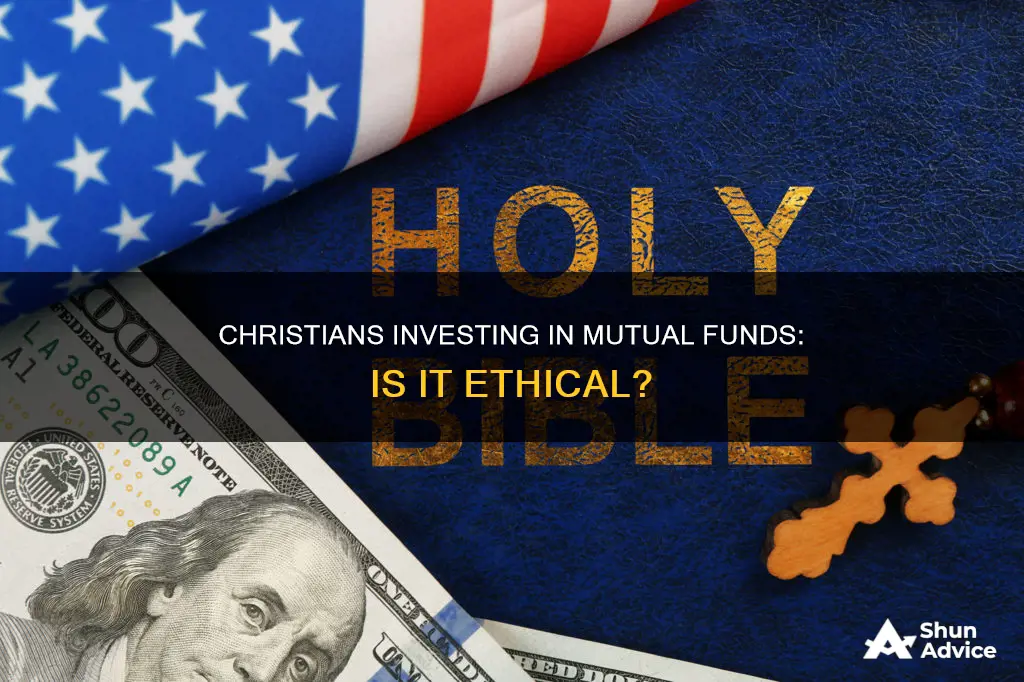
Faith-based investing is a type of investment philosophy that allows individuals to choose their investment professionals and vehicles based on their religious values. Christian mutual funds are a type of values-based investing where investors put their money into stocks that align with their beliefs and principles. While faith-based investing does not guarantee returns, it allows Christians to invest in companies that uphold their values, such as human rights, environmental responsibility, and fair employment practices. Christian mutual funds can provide peace of mind and decent long-term rates of return, making them a viable option for Christians looking to grow their money while staying true to their faith.
| Characteristics | Values |
|---|---|
| Purpose | To invest in companies that align with Christian values |
| Type of investment | Values-based investing |
| Investment approach | Faith-based investing |
| Investment focus | Ethical and socially responsible investment |
| Exclusion criteria | Alcohol, tobacco, weapons, adult entertainment, gambling, abortion, pornography, companies with heavy debt |
| Performance | Competitive, no guarantee of outperforming the market |
| Fees | High expense ratios |
| Example funds | Ave Maria Mutual Funds, Eventide Gilead, Timothy Plan |
What You'll Learn

What are sin stocks ?
"Sin stocks" are stocks that come with cultural and lifestyle baggage that may not appeal to investors who take a stand against immoral or unethical practices. There is no formal sin stock list, and the definition of a sin stock is subjective and varies among individuals and institutions. However, sin stocks generally refer to companies that engage in businesses that cultural forces may deem unethical.
Sin stocks typically include companies involved in the following sectors:
- Gambling: This includes casinos, sports betting applications and platforms, entertainment companies, and more.
- Alcoholic beverages: This sector includes large beverage conglomerates and companies that produce and distribute beers and wines.
- Tobacco products: Similar to the alcohol sector, this sector includes large conglomerate companies that produce cigarettes and other tobacco products.
- Weapons and defense: This sector includes firearms and military arsenal providers, as well as aerospace and tech companies that may be involved in the production of weapons.
- Sex and adult entertainment: This sector includes adult-themed social media networks, publishers, media companies, and businesses involved in the adult entertainment industry.
- Fossil fuels: This sector includes energy companies that may be involved in the production of coal, oil, or gas, which can contribute to environmental concerns.
It is important to note that the definition of sin stocks can vary depending on cultural, religious, and personal values. For example, some investors may view defense stocks as virtuous investments, as they contribute to national security. In contrast, others may consider them sin stocks due to their association with violence and conflict.
Sin stocks, also known as vice stocks, have historically performed better than their more "wholesome" market competitors. However, investing in sin stocks may raise ethical concerns for some individuals, especially if the products or services provided by these companies have negative physical, mental, or societal impacts.
Warren Buffett's Widow's Index Fund Investment Choice
You may want to see also

What are faith-based investing strategies?
Faith-based investing strategies allow investors to put their money where their values are. These strategies are just like any other type of investment philosophy in that they aim to maximise investor returns. However, they differ from traditional, secular investment plans in how individuals choose their investment professionals and vehicles. Faith-based investors want to generate returns by choosing investments that align with their religious beliefs and values.
Faith-based investment strategies focus on socially and ethically responsible investments. The majority of these styles exclude investment in companies that are deemed immoral, such as those involved with alcohol, tobacco, adult entertainment, gambling, and weaponry.
Some faith-based funds invest according to a set of religious principles, such as Catholic or Islamic values. For example, Islamic or Sharia law prohibits investment in companies involved with alcohol, pork, gambling, pornography, or tobacco.
Faith-based investors can also choose to exclude investments that go against their values, such as gambling, adult entertainment, or abortion. Other funds may look to invest in companies that actively promote redemptive practices.
Faith-based investing strategies have a track record of being profitable. Over the past five years, a composite of the returns from all of the equity mutual funds within the Christian Investment Forum outperformed the industry average by 77 basis points annually.
However, it's important to note that faith-based investing, like conventional investing, doesn't guarantee returns. This style of investing is subject to the same risks as any other investment style, including economic, interest rate, and geopolitical risks.
Investing in Funds: A Smart Choice for Your Money?
You may want to see also

What are the pros and cons of faith-based investing?
Faith-based investing is a type of investment philosophy that aims to maximise investor returns while aligning with an individual's religious beliefs and values. While it is similar to other types of investing in that it seeks to maximise investor returns, it differs in how individuals choose their investment professionals and vehicles. Faith-based investors often opt for managers, companies, and investments that align with their religious values, leading to this strategy also being called values-based investing.
Pros of Faith-Based Investing
Faith-based investing allows individuals to generate returns while staying true to their religious beliefs and values. This strategy can help like-minded investors avoid putting their money into items and practices that contradict their spiritual values, such as alcohol, tobacco, pornography, gambling, and weapons.
Faith-based investing has a track record of being profitable. Over the last five years, a composite of the returns from all the equity mutual funds within the Christian Investment Forum outperformed the industry average by 77 basis points annually. In a study published in the Journal of Investing in 2010, it was found that from 1998 through 2009, the annual return for faith-based Christian and Islamic funds was 4.55% compared to 5.72% for all mutual funds.
Cons of Faith-Based Investing
One of the challenges of faith-based investing is the limited universe of investable assets due to the screening criteria based on religious values. This can restrict the ability to diversify, as certain industries are excluded due to religious guidelines.
Faith-based investing funds also tend to have higher fees and expense ratios than other types of funds. For example, the Iman Fund, which invests in companies adhering to Islamic principles, has an expense ratio of 1.33%, or $133 annually for every $10,000 invested.
Additionally, faith-based investing, like conventional investing, does not guarantee returns and is subject to the same risks as any other investment style, including economic, interest rate, and geopolitical risks.
Retirement Year Funds: Smart or Risky Move?
You may want to see also

What are some examples of Christian mutual funds?
Christian mutual funds are a type of values-based investing, where investors put their money into stocks that align with their values and principles. Some examples of Christian mutual funds include:
- The Timothy Plan: The founding mutual fund family of Biblically Responsible Investing, The Timothy Plan offers several Christian mutual fund options. The term “Morally Responsible Investing” was first coined by The Timothy Plan, and it is also known as Biblically Responsible Investing or Investing With Your Values. The Timothy Plan is the number one Christian mutual fund family used for Christian businesses' SIMPLE IRA plans. The Timothy Plan has 13 different Christian mutual funds, including:
- Large/Mid Cap Value
- Large/Mid Cap Growth
- Israel Common Values
- Inflation-Sensitive Fund
- Defensive Strategies
- Conservative Growth
- Small/Mid Cap Growth (formerly Aggressive Growth)
- GuideStone Funds: GuideStone Funds provides investments that are socially screened and based on Christian values. The company serves investors of all kinds, from institutional to individual investors. Fund offerings range from U.S. and international equities to fixed income. GuideStone Funds had $16.7 billion in assets under management as of June 30, 2023, making it one of the largest faith-based fund managers in the United States.
- Eventide Funds: Eventide Funds is one of the newer Christian mutual fund families, starting in 2008, but it has grown quickly due to its different style of investing. It is known in the Christian mutual fund arena and the entire mutual fund industry. Since 2008, Eventide Funds has become one of the fastest-growing Christian mutual fund families.
- Ave Maria Mutual Funds: Originally designed for the Catholic Church and its members, Ave Maria Mutual Funds has now become mainstream for all Christian believers who want to invest according to Conservative values, especially those that take a strong Pro-Life stance. Ave Maria offers five diverse mutual fund choices.
- Catholic Investment Services: Catholic Investment Services seeks strong returns for its clients while keeping religious principles at the heart of its investment strategy. The firm serves more than 50 Catholic institutions, has a list of 800 restricted companies, and has more than $1 billion in assets under management.
- LKCM Aquinas Fund: The LKCM Aquinas Fund follows the socially responsible investment (SRI) guidelines set by the U.S. Conference of Catholic Bishops. It aims to maximize investor capital in the long term with Catholic investing principles in mind.
Index Funds: Investing via Apps
You may want to see also

What are some alternatives to Christian mutual funds?
When it comes to investing, Christians may wish to consider alternatives to mutual funds if they are concerned about their money being used in ways that conflict with their beliefs and values. Here are some alternatives to Christian mutual funds:
Socially Responsible Investing (SRI)
SRI is an investment approach that prioritises social responsibility and consciousness. It involves investing in companies that demonstrate good social value and ethical, social, and environmental practices. This strategy is popular among investors who want to generate returns while also doing good and upholding their values.
Biblically Responsible Investing (BRI)
BRI is a type of SRI that aligns specifically with Biblical values. BRI funds may use negative screening to exclude investments that conflict with these values, such as abortion, pornography, gambling, and adult entertainment. They may also use positive screening to actively seek out companies that promote redemptive practices. Examples of BRI mutual fund providers include Timothy Plan and Ave Maria Mutual Funds.
Values-Based Investing
Values-based investing is an approach where investors choose managers, companies, and investments that align with their religious values and principles. This strategy is not limited to Christians and can be applied by individuals of any faith. For example, Catholic investors may favour companies that support human rights, environmental responsibility, and fair employment practices, while avoiding companies that engage in racial discrimination or produce weapons of mass destruction.
Direct Indexing
Direct indexing is a technique that allows investors to transition from holding funds to holding individual stocks. This approach offers investors the opportunity to customise their portfolios and exclude companies that conflict with their values. For example, Ronald Blue Trust Access Portfolios offer SMAs (Separately Managed Accounts) that enable investors to exclude companies using a menu of values-based screens.
Hire a Firm that Specialises in Faith-Based Investing
Firms such as GuideStone, The Timothy Plan, and Sharia Portfolio screen investments based on specific faith-based criteria. For instance, The Timothy Plan uses Biblically Responsible Investing filters to ensure that no money is invested in companies that support ideals contrary to Biblical moral imperatives.
In summary, Christians have several alternatives to mutual funds that allow them to invest in alignment with their values. These include socially responsible investing, Biblically responsible investing, values-based investing, direct indexing, and hiring specialist firms to screen investments. It is important for Christians to understand their investment options and make informed decisions that reflect their financial goals and faith.
Invest in Berkshire Hathaway: A Guide to Buffett's Fund
You may want to see also
Frequently asked questions
Christian mutual funds are types of mutual funds that invest money in companies that align with Christian values. They are a type of values-based investing, where investors put their money into stocks that align with their values and principles.
Christian mutual funds can give you peace of mind as they are super picky about what stocks they buy, so you don’t have to worry about profiting from a business that goes against your beliefs or values. Some Christian mutual funds also have decent long-term rates of return, so they can be a good choice for your retirement investments.
Sin stocks usually fall into the category of alcohol, tobacco, gambling and weapons. These companies are not doing anything illegal, but their businesses are based on activities some people find unethical or immoral.
It's important to do your research and consult a financial professional who subscribes to your principles. While you can find investments that align with your faith, make sure they fit your financial profile, economic situation, and short- and long-term goals.
Some examples of Christian mutual funds include Ave Maria Mutual Funds, Eventide Gilead, and Timothy Plan.







